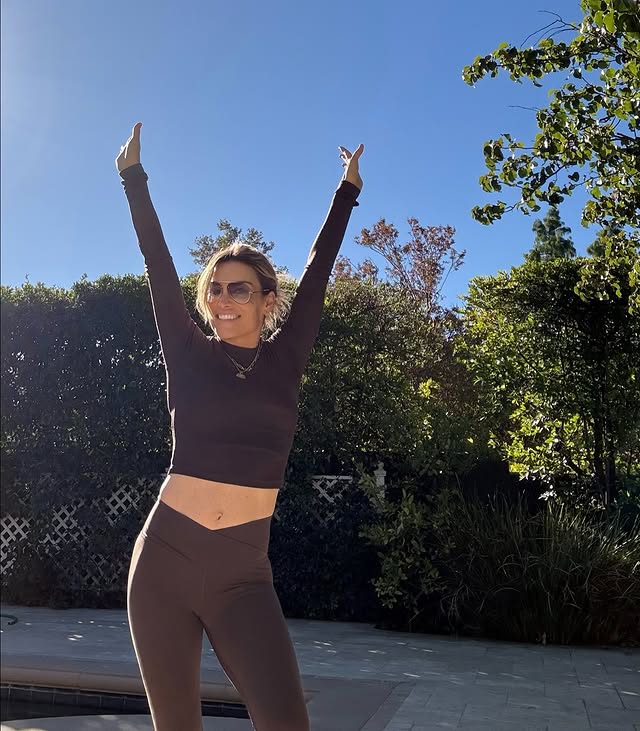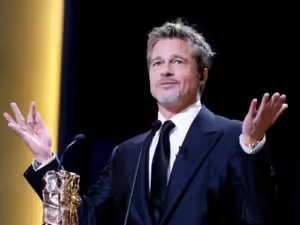

In the latest episode of “The Coop” podcast, Kit Hoover recently delved into a topic that resonates deeply with many – how to maintain friendships with ex-partners.
This discussion became particularly relevant given that it occurred just a week after Us Weekly confirmed her separation from her husband, Crowley Sullivan.
The Background of Their Conversation
Kit Hoover’s Recent Breakup
Kit Hoover, at 54 years old, is facing a challenging time.
After over two decades of marriage, the announcement of her split from Crowley Sullivan has sparked conversations about life after love.
Being in the public eye, Kit’s experiences raise questions about how to navigate relationships once romantic ties have been severed.
Inviting Elizabeth Hurley
In this episode, Hoover reached out to Elizabeth Hurley, a celebrated actress known for her ability to maintain friendships with her former partners.
The respect and warmth Hurley has towards her exes caught Hoover’s attention.
During their conversation, Hoover posed the intriguing question: “You’re best friends with all of your exes, right?”
This question set the tone for a rich discourse on romantic relationships and friendships.
Insights from Elizabeth Hurley
Cherishing Past Relationships
Hurley, who dated Hugh Grant from 1987 to 2000, affirmed that he is indeed the godfather to her son, Damian.
“I’m great friends with Hugh,” she shared, highlighting her ability to foster relationships beyond romance.
She also mentioned her strong connections with her other exes, indicating that despite life’s changes, the bonds forged in love remain significant.
Successful Relationships and Moving On
Reflecting on her four past relationships, Hurley considers each one a success.
She stated, “I really loved them, and they were all my best friends when we were together.”
For her, the idea of romantic friendship captures the essence of these relationships.
“There’s still romance that’s there,” Hurley explained, pointing to a unique dynamic where affection can remain intact even after romantic involvement ends.
Emotions and Family Ties with Exes
Viewing Exes as Family
Hurley deepened the conversation by describing how she sees her exes as family.
“I wouldn’t know how to not have them in my life,” Hurley remarked, likening the connection to that of siblings or close family members.
This speaks to a nurturing aspect of past relationships, emphasizing that even if romance fades, the emotional ties can linger.
Protectiveness and Affection
Hurley elaborated on the emotional range applicable to these friendships.
“You can be frustrated and pissed off with them,” she acknowledged, “but you’d also be incredibly protective over them.”
This illustrates the complexity of human relationships where love can transform yet remain supportive.
The Personal Context of the Discussion
Impact of Hoover’s Separation
This conversation is particularly poignant for Kit Hoover, who is adjusting to life as a single woman and navigating the intricacies of her relationship history.
As she contemplates her ties to her ex-husband and other former partners, the insights shared by Hurley offer valuable guidance.
Reflections on Marriage and Parenthood
Married in August 1999, Hoover and Sullivan share three children: daughters Campbell (22) and Hayes (21), and son Crowley (17).
As Hoover seeks to understand how to maintain a healthy relationship with her ex, the challenge of balancing co-parenting with emotional transitions becomes paramount.
How to Effectively Navigate Friendships with Exes After a Breakup
Navigating relationships after a breakup can be complicated, especially when it comes to maintaining friendships with ex-partners.
While many people wonder if they can stay friends with someone they once loved, the path isn’t always clear.
However, with the right approach, it’s possible to create a healthy and supportive friendship after a romantic relationship ends.
In this post, we’ll explore effective strategies for doing just that.
Understanding the Reasons to Stay Friends
Why Maintain a Friendship?
It’s important to think about why you might want to stay friends with an ex.
Many individuals share deep bonds that can persist beyond romance.
For some, the friendship offers emotional support during a difficult time.
Mutual friends and family dynamics might also contribute to wanting to keep that connection.
Assessing the Relationship
Before you pursue a friendship, consider the nature of your past relationship.
Was it healthy? Were there significant issues that led to the breakup?
If the relationship was toxic or abusive, it’s crucial to prioritize your well-being and consider whether staying friends is genuinely in your best interest.
Setting Boundaries
Establish Clear Boundaries
One of the most important steps in transitioning from romance to friendship is establishing clear boundaries.
Discuss what both of you are comfortable with, including how often you’ll see each other and whether you’ll talk about your new relationships.
This can help prevent misunderstandings and hurt feelings.
Avoiding Mixed Signals
It’s vital to keep your intentions clear to avoid sending mixed signals.
If one person still harbors romantic feelings, and the other does not, navigating the friendship can become confusing.
Both parties should commit to maintaining a platonic relationship for it to be successful.
Communicating Openly
Honest Conversations
Open and honest communication is key in any relationship, but it becomes even more important when transitioning from a romantic connection.
Express your feelings and expectations clearly.
If something bothers you, address it directly rather than letting resentment build over time.
Checking In Regularly
Regular check-ins can help maintain the friendship.
Schedule time to catch up and discuss how you both feel about the friendship.
This practice can help you both stay on the same page and ensure that the relationship remains healthy.
Embracing Change
Acknowledge Emotions
It’s natural to feel a mix of emotions after a breakup.
Recognize that both you and your ex might experience sadness, anger, or confusion.
Allowing space for these feelings can help in processing the change.
How to Maintain a Healthy Relationship with an Ex While Moving On
Ending a romantic relationship can be challenging, especially when it comes to the question of whether to remain friends with an ex.
Many people wonder if it’s possible to transition from romantic partners to friends without complications.
The answer is yes, but it requires careful navigation and consideration of a few important steps.
In this blog post, we will outline practical steps you can take to maintain a healthy relationship with your ex while also moving on with your life.
Understanding the Need for Boundaries
Why Boundaries Matter
Setting boundaries is one of the first steps to maintaining a healthy relationship with an ex.
Boundaries help define what is acceptable in the new relationship dynamic and protect both parties emotionally.
They can prevent misunderstandings and encourage respect.
Discuss Your Boundaries Early On
After the breakup, have an open conversation with your ex about what you both want going forward.
Discuss topics like communication frequency, social interactions, and involvement in each other’s lives.
This proactive approach can lay a solid foundation for the friendship.
Prioritizing Emotional Healing
Allow Time and Space
Healing after a breakup is essential.
Taking time apart can help both individuals process their emotions.
This period of separation can promote personal growth and clarity about the relationship.
Engage in Self-Reflection
Use this time to reflect on what you want moving forward.
Consider what you appreciated about the relationship and what did not work.
This insight can help you define your personal needs and boundaries better.
Open and Honest Communication
Share Your Feelings
Clear communication is vital for any successful relationship, including friendships with an ex.
Be honest about your feelings and expectations.
If something bothers you, express it rather than letting it fester.
Check-In Regularly
Regular check-ins can help both of you stay on the same page.
Schedule time to catch up and discuss how the friendship is evolving.
This helps prevent misunderstandings and reinforces your connection.
Embracing Change
Acknowledge That Things Will Change
Understand that as you both move on, the dynamics of your friendship may shift.
New relationships, changes in life circumstances, and personal growth can all impact how you relate to each other.
Be Open to New Experiences
As you both adjust to your new lives, be open to exploring new experiences.
Engaging in different activities together can help strengthen your bond as friends.
Try doing hobbies that you both enjoy, or even discover new interests together.
Supporting Each Other
Celebrate Each Other’s Successes
Part of maintaining a healthy friendship involves supporting one another.
Celebrate your ex’s achievements and milestones, showing that you still care for them as a friend.
Be There in Tough Times
During challenges, offer a listening ear or a shoulder to lean on.
Supporting each other through difficult times can strengthen your friendship and show mutual respect.
Knowing When to Let Go
Assess the Friendship Regularly
Take time to evaluate the friendship periodically.
Ask yourself if the relationship is still beneficial for both parties.
Recognize signs that it may be time to take a step back if it no longer serves you positively.
Consider the Impact of New Relationships
In the event that either of you starts dating someone new, it’s important to reassess the friendship.
Discuss how this may affect your dynamic and be considerate of your new partners.
Prioritize the feelings of everyone involved to maintain respect.
Seeking Professional Help if Needed
When to Consider Therapy
Sometimes, the emotions surrounding a breakup can be overwhelming.
If maintaining a friendship with an ex proves challenging, consider seeking help from a therapist.
Professional guidance can help explore unresolved feelings and establish healthier boundaries.
Support Groups
Additionally, support groups can provide a space for individuals navigating similar experiences.
Sharing stories and strategies can offer new perspectives on maintaining relationships post-breakup.
When Love Changes: How Past Partners Become Like Family
Relationships can be incredibly complex, often leading to deep emotional attachments that go beyond romance.
When a romantic relationship ends, many people find themselves pondering how their past partners can still occupy a significant place in their lives.
In some cases, these former lovers can transition into roles resembling those of family members.
This blog post will explore the various ways this transition happens and the factors that contribute to partners becoming akin to family even after a relationship ends.
The Nature of Deep Connections
Understanding Emotional Bonds
Romantic relationships often involve strong emotional connections.
When we love someone, we share intimate moments, dreams, and challenges that create lasting memories.
These experiences can forge deep bonds that outlast the romantic aspect of the relationship.
Shared Experiences and Memories
Over time, couples cultivate shared experiences that shape who they are.
From vacations to family gatherings, these shared memories form a unique history.
Even after a breakup, these memories can linger, fostering feelings of affection and attachment.
Moving Beyond Romance
Embracing the Transition
Moving from a romantic relationship to a friendship can be challenging.
However, it is important to acknowledge that the end of a romantic relationship does not necessarily mean the end of a meaningful connection.
Loving feelings may remain, evolving into a different type of bond.
How Love Transforms
Love may transform from a passionate romance into a familiar affection.
This can manifest as a caring friendship where both individuals continue to support each other’s lives.
The emotional depth can resemble that of family, characterized by loyalty and protection.
Communication After the Breakup
Open Dialogue is Key
After a breakup, maintaining open lines of communication becomes crucial.
Expressing feelings and discussing the desire to remain connected can help both partners navigate their new roles.
This openness fosters mutual understanding and respect.
Setting New Boundaries
As the relationship shifts, creating new boundaries is essential.
Both parties should discuss how they want their relationship to look moving forward.
This clarity helps prevent misunderstandings and sets the stage for a positive, family-like connection.
Continued Support and Care
Being There for One Another
One of the hallmarks of family-like relationships is the willingness to support one another.
Former partners who choose to remain in each other’s lives often find themselves caring about each other’s well-being.
This support can include emotional assistance during challenging times or celebrating achievements.
Celebrating Milestones Together
When past partners remain close, they may continue celebrating milestones together, just like family would.
Engagements, birthdays, or promotions can be occasions for support and joy, further solidifying their connection.
These shared celebrations reinforce feelings of love and belonging.
Navigating Changes in Dynamics
Adjusting to New Relationships
As life progresses, one or both partners may begin new romantic relationships.
Navigating this change requires understanding and communication.
Discussing how new partners feel about the friendship can prevent potential conflicts.
Maintaining Respect
Respect is key when new relationships develop.
Being considerate of each other’s boundaries ensures that the family-like bond remains strong.
Respecting new partners’ feelings also helps maintain a harmonious friendship.
The Emotional Complexity of Former Lovers
Embracing Old Memories
Even after a breakup, fond memories can surface, complicating the friendship.
Acknowledging these feelings without letting them dictate the relationship is important.
This maturity can allow for a positive connection that feels familial.
Processing Feelings of Loss
A breakup can bring feelings of loss, even if the friendship remains intact.
Processing these emotions can help former partners understand their bond better.
Recognizing that they can still care for and support each other may ease this transition.
The Role of Time and Patience
Allowing Time for Healing
After a breakup, those involved need time and space to heal emotionally.
This period allows individuals to reflect on what they want from the new relationship.
It is vital to give each other time to adjust to the new normal.
Practicing Patience
Transitioning from a romantic bond to a familial-like friendship can take time.
Patience is essential during this adjustment phase.
The road may be bumpy, but allowing feelings to settle can lead to a deeper, more meaningful relationship.



















